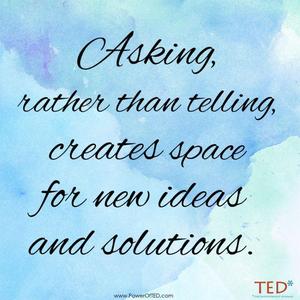If you have listened to any of the US Presidential debates, it is clear we live in a culture of "telling." Our American culture is based upon rugged individualism, competition and getting things done fast. Therefore, it's no surprise candidates have succumbed to telling us, in boisterous and sometimes very rude voices, how they will be the nation's Rescuer and fix everything.
It's not all their fault. Historically, many citizens wanted strong-willed candidates who would solve their problems. This happens when voters feel victimized by current circumstances and yearn for a Rescuer to fix things.
Once in office, when the politician doesn't solve all the problems, voters can then feel Persecuted by the politician who didn't fulfill their promises. In the next election cycle, voters often look for another hero-rescuer and the drama cycle starts all over again.
Our purpose here is not to analyze the angry political discourse of US Presidential politics -- as tempting as that might be. It's just that politics is currently a very visible example of what we call a "telling culture" which fuels the Dreaded Drama Triangle™ (DDT).
In the DDT, Rescuers either act to fix or take care of Victims or tell them what they need to do. Rescuers think of others first, so it's their job to know everyone else's business and tell others what needs to happen. (As we have written many times before, as "Recovering Rescuers" ourselves, we know this pattern all too well!)
But, Persecutors also tell. Driven by their need to control chaos and uncertainty, the person who takes on the Persecuting role, chooses telling as a way to micromanage and keep control of any situation.
Finally, the Victim in the DDT is not off the hook either. They tell others that they are powerless to make a difference and turn their "voice" over to either the Rescuer or Persecutor to take care of things.
The positive alternative is to create an "Inquiry Culture" based upon asking rather than telling. Such a culture requires all of us to lean into the TED* (*The Empowerment Dynamic)™ roles of Creator, Challenger and Coach.
Inquiry embraces "not knowing" as the essential first step of shifting from telling to asking. Inquiry engages the sensibility of curiosity, which is at the core of the TED* Coach role. With curiosity we investigate, explore and seek to understand other views and ideas.
Telling is singularly focused and implies only we "know" and the other person does not. Asking is interested in multiple perspectives and genuinely wants to understand.
In the true sense of the coaching inquiry, we are simply interested in what is going on and how others are seeing things. This is tricky because, as a manager, team leader, or even spouse, there are times when we need to deliver a specific answer or direction.
In an "inquiry culture," we can advocate for a decision or a course of action. However, as Co-Creators, rather than merely telling others what they should or should not do, we advocate for what we think is best and invite others to state their perspective. Then we listen.
Such an inquiry culture opens us to co-create relationships that bring safety to discovery and discourse. Then we have the possibility of generating the most informed and empowering outcomes for all concerned.
by David Emerald & Donna Zajonc


